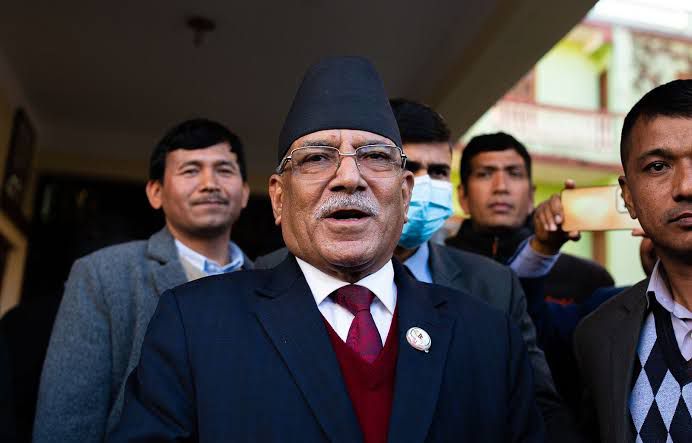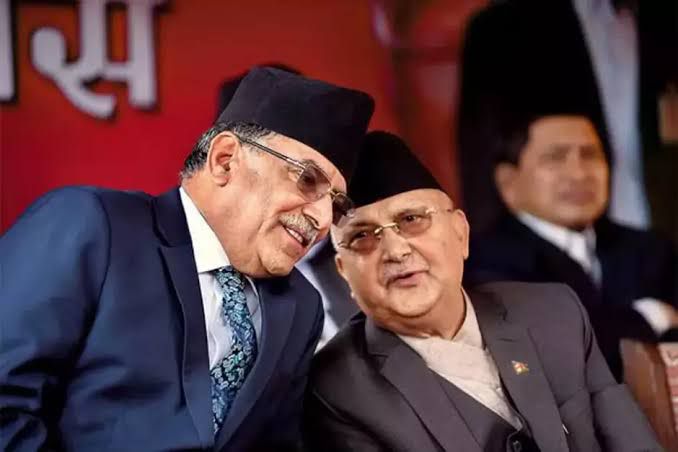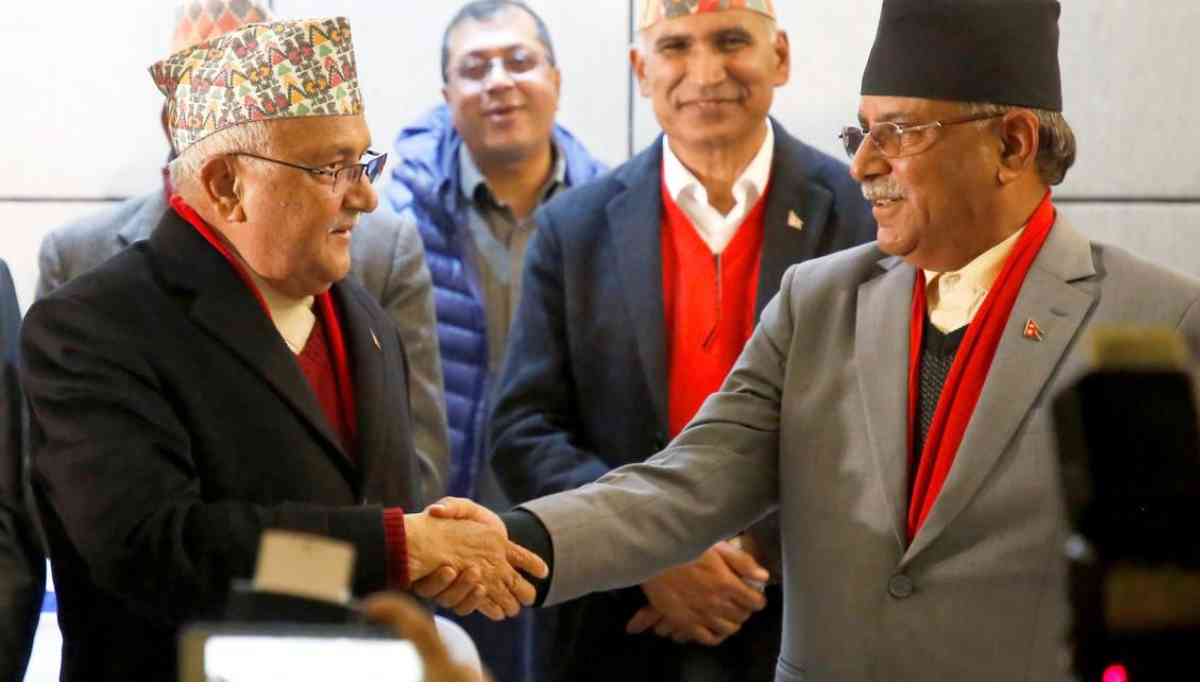Nepal's Prime Minister Pushpa Kamal Dahal 'Prachanda' reorganized his cabinet on Monday, ending a year-long alliance with the Nepali Congress and forming a new coalition with the Communist Party of Nepal (Unified Marxist–Leninist) led by former PM K.P. Sharma Oli and featuring ministers from two opposition parties.
Oli was regarded as the main critic of Mr. Prachanda. Due to differences over supporting the main opposition party's presidential candidate, the CPN-UML withdrew its support from the Prachanda-led administration last year.
Rift between Nepali Congress and Prachanda
The alliance between the Communist Party of Nepal (Maoist Centre) under Mr. Prachanda's leadership and the Sher Bahadur Deuba-led Nepali Congress has ended due to escalating differences between the two top leaders, as stated by a CPN-Maoist Centre party official.
According to a CPN-Maoist Centre party official, the alliance between the Sher Bahadur Deuba-led Nepali Congress and the Communist Party of Nepal (Maoist Centre), led by Mr. Prachanda, has broken down because of growing disagreements between the two main leaders.
Last year, Dahal formed a coalition ministry with the Nepali Congress and a few other smaller parties. But the Nepali Congress had come under fire from his Maoist Centre party, the third largest party in the 275-member parliament, for not giving him a free hand and for blocking the dismissal of several ministers he disagreed with.

The CPN-Maoist Secretary, Ganesh Shah, told PTI, "Since the Nepali Congress did not assist the Prime Minister, we are forced to seek a new alliance.”
Tensions between the senior leadership of the two parties intensified as a result of differences between Finance Minister Prachanda and Nepali Congress leader Mahat over budget allocations for certain projects, widening the gap between the Maoist Center and the party. With the Communist Party of Nepal (Unified Marxist-Leninist), headed by former prime minister KP Sharma Oli, former guerilla leader Prachanda forged a new partnership.
The disagreement escalated when Prachanda intended to designate a member of his own party for the pivotal post of Chairman of the National Assembly, and Nepali Congress President Deuba pushed for the nomination of the party's senior leader and recently elected lawmaker Krishna Sitaula.
According to Bishwa Prakash Sharma, general secretary of the Nepali Congress, "it is evident that the prime minister himself ended the coalition with us."
Dahal's press secretary, Govinda Acharya, countered, saying that the prime minister's capacity to cooperate with the Nepali Congress was hampered mostly by policy differences. He is thus adding the RSP and the UML as new coalition members.
Officials from the party revealed that Dahal sought to remove a number of "non-performing" ministers, such as Finance Minister Prakash Sharan Mahat of the Nepali Congress, on the grounds that they had not done enough to boost the $40 billion economy.
In response, FM Mahat said that the nation's economic status has improved from the year before.
In addition, the Nepali Congress and Dahal's Maoist Center are fighting for control of the National Council, a parliamentary body that is essential to passing new laws.
Alliance between Prachanda and Oli
According to Mr. Shah, CPN-UML Chairman Oli and Mr. Prachanda had talks on Monday at the Prime Minister's house in Baluwatar, with an emphasis on the creation of a new coalition. The two leaders discussed a range of topics, such as the formation of a new administration, plans for the future, and possible leftist alliances.
After the meeting, leaders of three political parties met in Baluwatar to continue discussing the details of the new alliance and the formation of the upcoming government. These leaders included Prime Minister Prachanda, CPN-UML Chairman Oli, and Rashtriya Swatantra Party (RSP) leader Ravi Lamichhane.
President Ram Chandra Paudel swore in three ministers on Monday after the alliance. Even though they had not yet been given a portfolio, Padam Giri of the Communist Party of Nepal (UML), Hit Bahadur Tamang of the CPN, and Dol Prasad Aryal of the Rastriya Swatantra Party swore the oath of office and secrecy at the President's office, Sheetal Niwas. At present, no minister has been assigned any portfolios.
Nepal's Prime Minister Prachanda is keeping 25 ministerial posts for himself, including those related to economics, foreign policy, defense, and domestic affairs. On December 25, 2022, Mr. Prachanda became prime minister for the third time, this time with the support of the Nepali Congress.

Analysts pointed out that the prime minister must request a vote of confidence in parliament within 30 days after the change in coalition partners, a move that is expected to be approved. Party leaders said that the full cabinet will probably be revealed after that.
The Nepali Congress won 89 of the 275 seats available in the general election held in November 2022, making it the largest party in the House of Representatives. The Maoist Center received 32 seats, and the CPN-UML came in second with 78. In addition, the CPN-Unified Socialist, Janata Samajwadi Party, and Rastriya Prajatantra Party (RSP) secured 20, 14, and 10 seats, respectively. A party needs the backing of at least 138 members of the House of Representatives in order to establish a government.
As the second-largest party in Parliament, the CPN-UML is anticipated to be a major ally of Mr. Prachanda's newly established government.
After leading a decade-long insurgency that began in 1996 and claimed 17,000 lives, Dahal entered mainstream politics through the United Nations-mediated peace accord of 2006.
Even though he is in his third term as prime minister, he did not serve out the full five years in his previous positions. Following the fall of its 239-year-old monarchy and the establishment of a republic in 2008, Nepal has had 13 different governments come and go.
©️ Copyright 2024. All Rights Reserved Powered by Vygr Media.
























